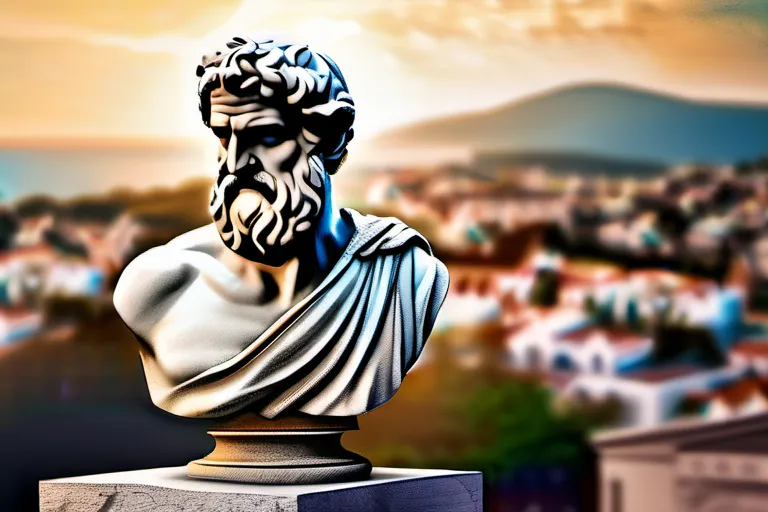Exploring the historical, cultural, and philosophical impact of Hellenism on religion
Hellenism, a religious and cultural phenomenon that originated in ancient Greece, has left an indelible mark on the world’s religions. This article delves into the significance of Hellenism in religion, exploring its historical, cultural, and philosophical impact.
The Origins and Development of Hellenism
The origins and development of Hellenism trace back to ancient Greece, where it emerged as a complex blend of philosophy, art, science, and religion. Imagine Hellenism as a river flowing through time, its waters carrying with them the rich traditions and innovations of Greek civilization. But how did this ancient culture manage to leave such an indelible mark on religions across the globe? Wasn’t Hellenism just a fleeting moment in history’s vast timeline?
As we delve into the historical roots of Hellenism, it becomes clear that its significance lies not only in its philosophical contributions but also in its cultural and religious influences. The golden age of Athens saw the flourishing of ideas that challenged traditional beliefs, giving birth to figures like Socrates, Plato, and Aristotle—thinkers whose inquiries into human nature and existence have resonated through centuries.
One wonders how the concepts of reason, logic, and individualism propagated by these philosophers could have transformed religious practices in far-flung regions. Could it be that the spread of Hellenism was akin to a seed planted in fertile soil, slowly growing into towering intellectual and spiritual structures? This propagation did not occur overnight; it was a gradual process that saw Hellenistic ideas intermingle with local beliefs, creating new syncretic practices.
The impact of Hellenism on the development of early Christianity is particularly noteworthy. As Greek thought permeated the Roman Empire, it provided a framework for Christian theology and doctrine. The concept of a personal god who interacts with humanity, as exemplified in Hellenistic philosophy, resonated deeply within Christian teachings. Could it be that without Hellenism, early Christians would have developed their beliefs differently?
The journey of Hellenism from ancient Greece to its influence on contemporary religions is a testament to the enduring power of ideas. It challenges us to ponder how culture and philosophy can shape religious practices and beliefs, even in contexts far removed from their origins. As we explore further chapters in this study, remember that every religion has been influenced by the currents of history, and Hellenism is just one of many streams that have flowed into the vast ocean of human spirituality.
Hellenism’s Cultural Impact on Religion
Hellenism, with its rich tapestry of cultural and philosophical influences, has left an indelible mark on religion across various cultures, including Christianity, Judaism, and Islam. Imagine a vast garden where different religions are like diverse flowers, each with its own unique hue but all sharing the nourishment of Hellenistic thought as their soil. How did this happen? And what makes Hellenism’s cultural impact so profound?
One could argue that Hellenism’s reach extended beyond just the classical era, weaving itself into the fabric of religious practices and beliefs through its emphasis on reason, philosophy, and ethical living. For instance, in Christianity, the concept of logos, a key term in Greek philosophy, resonates deeply with the Christian notion of the Word (Logos) made flesh as Jesus Christ. This metaphorical connection highlights how Hellenistic ideas influenced early Christian theology, suggesting that religious truths can be accessed through rational thought and philosophical inquiry.
In Judaism, too, the influence of Hellenism is palpable in certain theological discussions and texts during the Second Temple period, such as the apocryphal books. The idea of a personal God who is both transcendent and immanent has echoes of Hellenistic monotheism. How did these concepts merge to shape Jewish thought? And what does this tell us about the fluidity and adaptability of religious ideas?
For Islam, the cultural impact of Hellenism can be seen in its early history, particularly during the Islamic Golden Age when scholars like Al-Kindi and Al-Farabi engaged with Greek philosophical traditions. These thinkers used Hellenistic concepts to interpret Islamic teachings, enriching them with a philosophical depth that resonates even today. Could it be that without this cross-pollination, some of the most profound Islamic theological works might have lacked their rich intellectual landscape?
By exploring these intersections, we begin to see how Hellenism’s cultural impact on religion is not merely superficial but deeply transformative. It challenges us to view religious traditions as dynamic entities that are constantly shaped by their encounters with other cultures and ideas. In this sense, the study of Hellenism’s influence becomes a journey into the heart of human spirituality, revealing the universal quest for meaning and understanding that transcends boundaries.
Philosophical Foundations of Hellenism
The philosophical foundations of Hellenism are like the bedrock upon which many religious and cultural edifices were built. How did concepts such as pantheism, polytheism, and monotheism shape the way people perceived the divine? Let’s explore this in a way that makes you think about how these ideas have woven through the fabric of human belief.
Imagine pantheism as a vast ocean, where everything is connected by water. This concept suggests that God is present everywhere and in all things. It’s like the wind that blows through the trees, invisible yet ever-present. How did this view influence early Christian theologians who incorporated elements of Greek philosophy into their teachings? Wasn’t the idea of a pantheistic deity more accessible to people who were used to seeing deities as representations in temples and statues?
Polytheism, on the other hand, is like a bustling marketplace where many gods and goddesses interact. Each god has its own sphere of influence and can be worshipped for specific needs or occasions. Think about how this belief system was deeply ingrained in ancient Greek society, with each city-state having its patron deity. How did Hellenistic thinkers navigate the complexity of multiple deities when trying to understand a single, unified divine force?
Moving on to monotheism, consider it as a lighthouse guiding ships through treacherous waters. Monotheism proposes that there is only one god who created and governs all things. This idea was revolutionary in Hellenistic times, challenging the traditional pantheon-centric views. How did early Christians use this concept of a single, sovereign deity to spread their message? Wasn’t the transition from polytheism to monotheism a significant shift that required new ways of thinking about the divine?
The blending and evolution of these philosophical concepts in Hellenism created a dynamic religious landscape. Just as rivers merge into one another, forming larger streams and eventually oceans, the ideas of pantheism, polytheism, and monotheism intertwined to shape the beliefs and practices of many cultures. This chapter serves as a reminder that the quest for understanding the divine is an ongoing journey, influenced by the cultural and philosophical currents that have flowed throughout history.
Hellenistic Religions: A Closer Look
Hellenistic religions are like vibrant threads that weave through the fabric of ancient history, each one adding its unique pattern and color to the tapestry of human belief. Let’s explore three significant Hellenistic religious movements: Orphism, Mystery Cults, and Neo-Platonism.
Orphism: Imagine a religion that seeks not just knowledge but transformation—a path where the soul’s journey from birth to death is seen as a cycle of rebirth. Orphism offers this profound vision. Followers believe in the immortality of the soul and its transmigration, which is like a river flowing endlessly through life. The myth of Dionysus plays a central role, symbolizing both the suffering and resurrection of the individual soul.
These followers engage in rites that involve abstinence from meat and wine, reflecting a deep commitment to purity. They also perform elaborate rituals, such as the dromena, which are secret ceremonies meant to purify the participants and reveal deeper truths about existence. Through these practices, Orphism promises the release of the soul from the cycle of rebirths.
Mystery Cults: Think of Mystery Cults as hidden doorways that lead to profound spiritual experiences. These cults are known for their secretive nature and the initiations they offer, which often include symbolic death and rebirth rituals. The most famous is the Eleusinian Mysteries, dedicated to Demeter and Persephone. Participants would undergo a series of rites and teachings that were said to reveal the mysteries of the afterlife.
The emphasis in these cults lies not on public worship but on personal transformation. Initiates are taught to live virtuous lives and prepare for an afterlife filled with joy and immortality. The use of music, dance, and symbols during rituals creates a sense of awe and connection that goes beyond the physical world.
Neo-Platonism: As we move towards more philosophical religions, Neo-Platonism stands out as a bridge between ancient mysticism and later religious thought. It posits that reality is ultimately spiritual, with the material world being an illusion or shadow of eternal truths. The philosopher Plotinus is central to this tradition, whose writings delve into the concept of the One, the ultimate source of all existence.
Neo-Platonism encourages a life of contemplation and introspection, seeking understanding of the divine through reason and inner reflection. It emphasizes the importance of ethics and living in accordance with the cosmic order. This philosophy has left an indelible mark on Western thought, influencing Christian theologians like Pseudo-Dionysius and even early Islamic thinkers.
By examining these Hellenistic religions, we gain a deeper understanding of how ancient beliefs influenced and shaped modern religious practices. These movements offer insights into the human quest for meaning and the eternal questions that have plagued our minds since time immemorial.
Hellenism’s Legacy in Modern Religion
Imagine stepping into a vast library where every book contains stories of ancient beliefs and modern interpretations. In this digital age, Hellenism’s legacy has found its way into many religious texts and practices, much like a quiet stream that slowly carves deep into stone over centuries. How have the ideas of Hellenism influenced our understanding of divinity, ethics, and spirituality in today’s world?
Consider the concept of pantheism, where the divine is seen as immanent within nature. This idea, prevalent in ancient Greek philosophy, has been incorporated into modern religions like Wicca and some forms of Paganism. How does this transformation from abstract philosophical theories to practical spiritual practices shape our relationship with the natural world? Is it a case of merely borrowing ideas or something deeper—perhaps a fundamental shift in how we perceive the divine?
The notion of personal deities and sacred texts, common in Hellenistic religions, has also resonated across various modern religious communities. For instance, Hinduism’s emphasis on personal gods like Vishnu or Shiva mirrors the Greek pantheon’s personal attributes and roles. How do these deities provide comfort and guidance to believers? And what does this suggest about the adaptability of spiritual beliefs in different cultural contexts?
The ethical teachings derived from Hellenistic philosophy, such as the Golden Rule, have permeated many religious traditions. This principle—“treat others as you would like them to treat you”—can be found in various forms across religions, from Christianity and Islam to Buddhism. Why is this rule so universally appealing? Does it transcend cultural barriers or does its application vary significantly?
Hellenism’s influence on modern religion is not just about borrowed ideas but a deep integration that shapes our understanding of the spiritual world. As we navigate through the complexities of contemporary religious beliefs, Hellenism continues to serve as a bridge between ancient wisdom and modern spirituality. Could it be that by exploring this legacy, we are uncovering fundamental truths that have been waiting for centuries?
The Future of Hellenism in Religion
The future of Hellenism in religion is not just about revisiting its past; it’s about envisioning how these ancient ideas can shape our modern world. As we look ahead, what role might Hellenism play in the complex tapestry of global religions? Could its principles of philosophy and ethics offer a new framework for interfaith dialogue and cooperation?
Imagine a world where different faiths don’t just coexist but thrive together, each enriching the others with their unique wisdom. Hellenism’s emphasis on reason and human dignity could be pivotal in fostering such an environment. How might we adapt its philosophies to address contemporary issues like climate change or social justice? These are not just rhetorical questions; they are challenges that our future hinges upon.
Moreover, understanding the legacy of Hellenism is crucial for interfaith dialogue. Its contributions to ethical reasoning and philosophical inquiry provide a common ground where different beliefs can meet. By delving into these historical depths, we might uncover new ways to bridge gaps between religions, making them more inclusive and relevant in today’s diverse societies.
In this ever-evolving landscape of religious thought, Hellenism offers not just a historical echo but a vibrant voice that resonates with the needs of our time. Could it be that by embracing its principles, we are not merely honoring an ancient tradition but actively shaping a more harmonious and enlightened future?
Conclusion
 By understanding the role of Hellenism in religion, we gain a deeper appreciation for the interconnectedness of religious beliefs and practices across cultures and time periods. This knowledge can foster greater tolerance, empathy, and mutual understanding among people of different faiths.
By understanding the role of Hellenism in religion, we gain a deeper appreciation for the interconnectedness of religious beliefs and practices across cultures and time periods. This knowledge can foster greater tolerance, empathy, and mutual understanding among people of different faiths.











